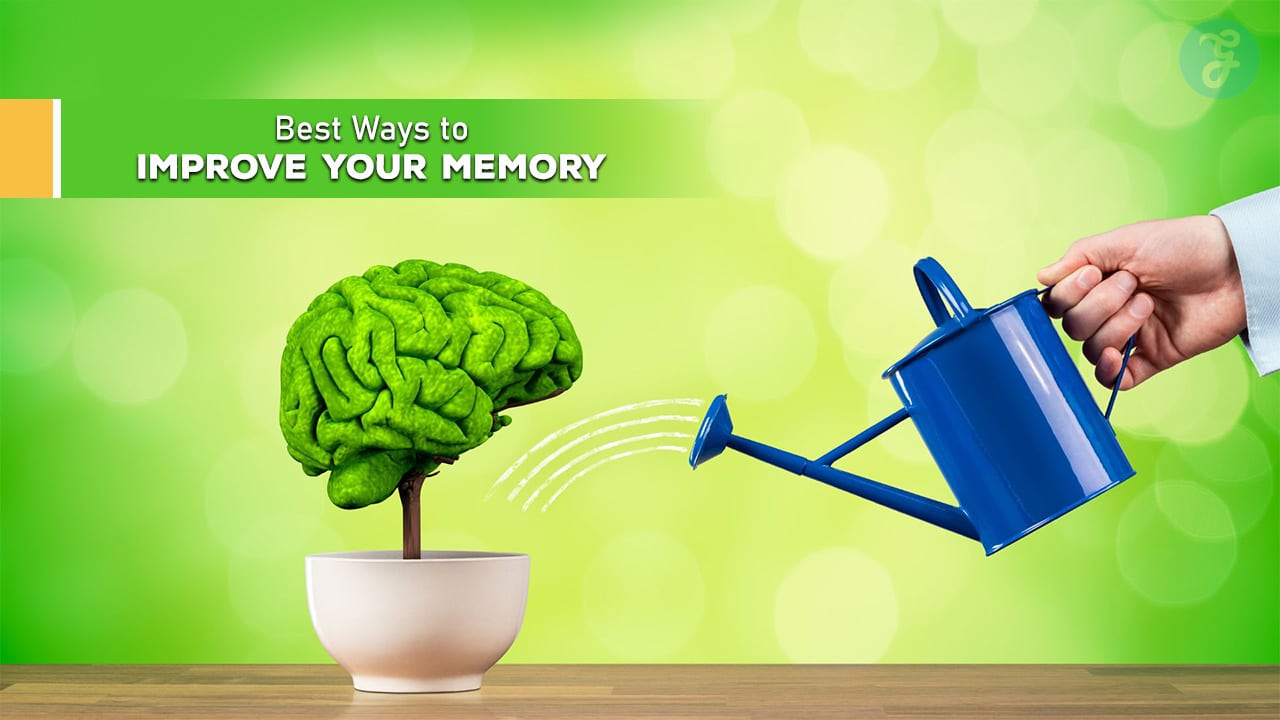Memory is a crucial part of our daily lives. It helps us remember important tasks, learn new skills, and cherish special moments. But sometimes our memory can let us down.
Have you ever forgotten where you put your keys or blanked on a friend’s name? Don’t worry, you’re not alone.
You can improve your memory and boost your brainpower with simple techniques and lifestyle changes. This article will explore the best ways to sharpen your mind and enhance your recall abilities.
From healthy habits to fun brain exercises, we’ll cover strategies that can help you remember more and forget less. Get ready to unlock your brain’s full potential!
1. Exercise regularly
Working out is great for your brain. When you exercise, more blood flows to your brain. This brings oxygen and nutrients that help your brain work better.
Regular exercise can make your memory stronger. It can also help you think more clearly and solve problems faster.
You don’t need to do intense workouts. Even a brisk walk for 30 minutes a day can make a big difference. Try to move your body most days of the week.
Exercise also helps you sleep better. Good sleep is important for a healthy brain and sharp memory.
You can choose activities you enjoy. Swimming, dancing, or playing sports are all good options. The key is to get your body moving and your heart pumping.
As you exercise, your brain makes new connections. This can help protect your memory as you get older.
Remember to start slowly if you’re new to exercise. You can build up over time. Talk to your doctor before starting a new exercise plan.
2. Eat a balanced diet
A healthy diet can boost your brainpower and memory. Eating the right foods gives your brain the nutrients it needs to work well.
Focus on fruits and veggies. Blueberries, grapes, and watermelon are great choices. They have compounds that may help your brain function better.
Include whole grains in your meals. Whole-grain breads and cereals provide steady energy for your brain.
Don’t forget protein. Fish like salmon and tuna are rich in omega-3 fatty acids. These fats are important for brain health.
Add some nuts to your diet. Walnuts are especially good. They contain nutrients that may improve brain function.
Limit red meat and eggs. Try to eat no more than four eggs per week.
Olive oil is a healthy fat option. Use it in cooking or as a salad dressing.
If you drink alcohol, keep it moderate. For women, that means up to one glass of wine per day.
Remember, there’s no single “magic” food for memory. A mix of healthy foods is best for your brain and body.
3. Get enough sleep
Sleep plays a key role in boosting your memory. When you get proper rest, your brain has time to process and store information.
A good night’s sleep helps your mind form new memories. It also strengthens connections between brain cells linked to memory.
Aim for 7-9 hours of sleep each night. This gives your brain enough time to go through important sleep cycles.
Try to stick to a regular sleep schedule. Go to bed and wake up at the same times daily, even on weekends. This helps set your body’s internal clock.
Create a relaxing bedtime routine. You could read a book, take a warm bath, or do some light stretching. These activities can help you wind down.
Make your bedroom sleep-friendly. Keep it dark, quiet, and cool. Use comfortable bedding and pillows.
Avoid screens before bed. The blue light from phones and computers can mess with your sleep cycle.
Cut back on caffeine and alcohol, especially in the evening. Both can disrupt your sleep quality.
If you have trouble sleeping, don’t toss and turn for hours. Get up and do a calm activity until you feel sleepy.
By prioritizing sleep, you give your brain the rest it needs to boost your memory and brainpower.
4. Challenge your brain with puzzles
Puzzles are great for keeping your mind sharp. They make you think in new ways and can boost your memory.
Try doing crosswords regularly. These word puzzles test your vocabulary and recall. You can find them in newspapers or online.
Sudoku is another good choice. It uses numbers and logic to challenge your brain. Start with easier puzzles and work your way up to harder ones.
Jigsaw puzzles are fun and helpful too. They improve your visual-spatial skills and short-term memory. Pick puzzles with different piece counts to vary the difficulty.
Don’t forget about word searches. They help with pattern recognition and concentration. You can find books of word searches or play them on your phone.
Try brain teasers and riddles as well. These make you think creatively and solve problems. Look for collections online or in puzzle books.
Mix up your puzzle choices. Doing different types keeps your brain on its toes. This variety helps build new neural connections.
Make puzzles a daily habit. Even 15 minutes a day can make a difference. You’ll likely see improvements in your focus and memory over time.
5. Stay mentally active
Keeping your brain busy is key to improving your memory. You can do many fun activities to stay sharp.
Try puzzles like crosswords or Sudoku. These games challenge your mind and help you think in new ways.
Learn a new skill or hobby. Pick up a musical instrument or try painting. This creates new connections in your brain.
Read books on different topics. This expands your knowledge and keeps your mind engaged. Try joining a book club to discuss what you’ve read.
Play strategy games like chess or bridge. These make you plan ahead and use problem-solving skills. You can find online versions or play with friends.
Take a class or watch educational videos. Learning new things at any age helps keep your brain active and alert.
Do math problems in your head. Start with simple addition and work up to harder calculations. This improves your mental math abilities.
Write stories or keep a journal. Put your thoughts on paper to boost creativity and memory recall.
6. Maintain social connections
Staying connected with others can improve your memory. Social interactions give your brain a workout. When you talk and listen to people, you exercise different parts of your mind.
Try to spend time with friends and family regularly. Join clubs or groups that interest you. This can help you meet new people and keep your brain active.
Phone calls and video chats count too. They let you connect even when you can’t meet in person. Try to reach out to someone at least once a day.
Group activities like book clubs or team sports are great for your brain. They combine social time with mental challenges. This double benefit can boost your memory power.
Volunteering is another good way to stay social. It gives you a chance to help others while keeping your mind sharp. Look for opportunities in your community that match your interests.
Remember, quality matters more than quantity. Focus on building meaningful connections. Deep conversations can stimulate your brain more than small talk.
7. Practice mindfulness and meditation
Mindfulness and meditation can boost your memory. These practices help you focus and stay present. They also reduce stress, which can hurt your ability to remember things.
To start, find a quiet spot. Sit comfortably and close your eyes. Take deep breaths. Focus on how your breath feels as you inhale and exhale.
When thoughts pop up, notice them without judgment. Then gently bring your attention back to your breath. Start with just 5 minutes a day. You can slowly increase the time as you get more comfortable.
Try to meditate at the same time each day. This helps make it a habit. You might do it right after waking up or before bed.
You can also practice mindfulness during daily activities. Pay attention to the taste and texture of your food while eating. Notice the feeling of water on your skin when washing dishes.
Regular practice can improve your focus and attention span. This makes it easier to remember new information. It also helps you recall things more quickly.
Mindfulness can reduce mental clutter too. This leaves more room in your mind for important memories. It may even help protect your brain as you age.
8. Take breaks during work
Taking breaks during work can boost your memory and brainpower. Short pauses help refresh your mind and increase productivity.
Try stepping away from your desk every hour or so. Even a 5-minute break can make a big difference. Use this time to stretch, walk around, or do some light exercises.
Breaks give your brain a chance to process information and form new connections. This helps you learn and remember things better when you return to work.
You don’t need long breaks to see benefits. Brief mental breaks, like looking out a window for a few moments, can help too. They let your mind wander and recharge.
Consider using techniques like the Pomodoro method. Work for 25 minutes, then take a 5-minute break. This keeps you focused and gives your brain regular rest periods.
During breaks, try to avoid screens and email. Instead, do something relaxing or enjoyable. This helps clear your mind and reduces stress.
Remember, taking breaks isn’t lazy – it’s smart. Regular pauses can help you work more efficiently and improve your memory in the long run.
9. Stay hydrated
Drinking enough water is key for a sharp mind. Your brain needs water to work well. When you’re thirsty, your memory and focus can suffer.
How much should you drink? Aim for 8 glasses of water a day. This helps your brain cells stay healthy and active.
Water also helps move nutrients to your brain. It removes waste too. This keeps your brain running smoothly.
Try carrying a water bottle with you. Sip from it often. You can also eat foods with lots of water, like fruits and vegetables.
If you feel tired or can’t concentrate, have a glass of water. It might be just what your brain needs. Remember, a hydrated brain is a happy brain!
10. Write things down
Writing things down is a powerful way to boost your memory. When you put pen to paper, you engage multiple senses and create a physical record of information.
This technique works for various types of information. You can jot down important dates, tasks, or ideas you want to remember. The act of writing helps cement the details in your mind.
Try keeping a small notebook with you. Use it to record things you need to remember throughout the day. This creates a habit of paying attention to important information.
You can also use sticky notes for quick reminders. Place them in spots you’ll see often, like your bathroom mirror or fridge door. This visual cue helps reinforce the information in your memory.
For longer-term memory improvement, consider journaling. Writing about your day helps you process and remember events better. It’s a great way to reflect on experiences and learn from them.
Don’t worry about perfect handwriting or grammar. The key is to get the information down quickly and in a way that makes sense to you. You can always clean it up later if needed.
Remember, writing things down isn’t just about creating a record. It’s about engaging your brain in the process of remembering. So even if you never look at your notes again, the act of writing can help improve your memory.
Understanding Memory Improvement
Memory improvement involves enhancing your brain’s ability to store and recall information. It’s a skill that can be developed through various techniques and lifestyle changes.
The Science Behind Memory
Your brain forms memories by creating connections between neurons. These connections strengthen when you repeat information or link it to existing knowledge. Sleep plays a big role in memory formation. During sleep, your brain processes and consolidates new information.
Certain brain areas are key for memory. The hippocampus helps form new memories and transfer them to long-term storage. The prefrontal cortex aids in working memory and recall.
Neurotransmitters like acetylcholine and dopamine are important for memory function. A healthy diet, exercise, and mental stimulation can boost these brain chemicals.
Common Myths About Memory
Many people believe memory declines sharply with age. This isn’t always true. While some changes occur, you can maintain good memory function as you get older.
Another myth is that you only use 10% of your brain. In reality, you use most of your brain all the time. Different tasks activate different areas.
Some think photographic memory is real. But perfect recall of visual details is extremely rare. Most people who seem to have this ability use memory techniques.
It’s also a myth that cramming is effective. Spacing out study sessions over time leads to better long-term retention than last-minute memorization.
Factors Affecting Memory
Your memory is influenced by various factors in your daily life. These include what you eat, how much you move, and your mental well-being.
Diet and Nutrition
What you put on your plate affects your brain health. Eating foods rich in omega-3 fatty acids, like fish and nuts, can boost your memory. Berries, leafy greens, and dark chocolate are also good for your brain.
Drink plenty of water to stay hydrated. A dehydrated brain struggles to remember things. Cut back on sugary drinks and alcohol, as they can harm your memory over time.
Try to eat smaller meals throughout the day. This keeps your blood sugar steady, which helps your brain work better.
Physical Exercise
Moving your body is great for your memory. Regular exercise increases blood flow to your brain, which helps it work better.
You don’t need to run marathons. A brisk 30-minute walk a few times a week can make a big difference. Dancing, swimming, or playing a sport are fun ways to get moving.
Exercise also reduces stress and improves sleep. Both of these are important for a sharp memory.
Mental Health
Your emotional state plays a big role in how well you remember things. Stress, anxiety, and depression can all hurt your memory.
Try to find ways to relax and unwind each day. This could be reading a book, listening to music, or practicing yoga.
Getting enough sleep is crucial. Your brain uses sleep time to sort through memories and store important information.
Stay social and keep your mind active. Talking with friends, solving puzzles, or learning a new skill can all help keep your memory strong.
Daily Habits to Boost Memory
Simple daily habits can have a big impact on your memory. Getting enough sleep and practicing mindfulness are two key ways to sharpen your mind and remember more.
Effective Sleep Patterns
Good sleep is crucial for memory. Aim for 7-9 hours each night. Go to bed and wake up at the same times daily. This helps set your body’s internal clock.
Create a relaxing bedtime routine. Try reading or listening to soft music before bed. Avoid screens for at least an hour before sleep. The blue light from devices can make it harder to fall asleep.
Keep your bedroom dark, quiet, and cool. Use blackout curtains if needed. A white noise machine can block out disruptive sounds.
Avoid caffeine late in the day. Try not to eat big meals close to bedtime. Both can interfere with sleep quality.
Mindfulness and Meditation
Mindfulness can boost your memory. It helps you focus and reduces stress. Start with just 5-10 minutes a day. Sit quietly and pay attention to your breath. When your mind wanders, gently bring it back.
Try a body scan. Focus on each part of your body from toes to head. Notice any sensations without judgment.
Use mindfulness in daily life. Pay full attention when eating or walking. Notice tastes, smells, and textures.
Meditation apps can guide you through sessions. Many offer short, beginner-friendly options.
Practice regularly. Even a few minutes daily can make a difference. You may notice improved focus and memory over time.
Takeaway
Improving your memory and boosting your brainpower doesn’t require drastic changes—simple, consistent efforts can make a significant difference.
Incorporating regular exercise, a balanced diet, adequate sleep, and mental challenges into your daily routine can enhance your cognitive function and keep your memory sharp.
Engaging in social interactions, practicing mindfulness, and staying hydrated are key strategies supporting brain health.
Remember, memory improvement is a journey, not a quick fix. By adopting these habits, you’re enhancing your memory and investing in your long-term mental well-being.
Start today, and unlock your brain’s full potential for a brighter, more focused tomorrow.






































